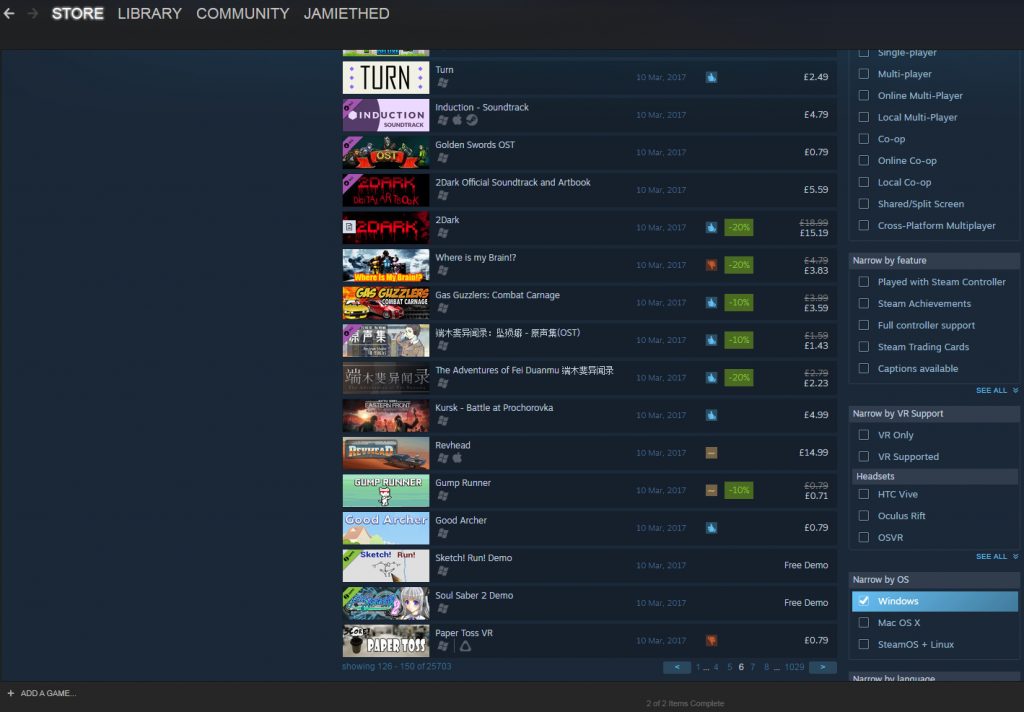On Games Journalism – The Grindy Bit(s)
As you may have gathered from previous articles in the “On Games Journalism” series, reviewing is, despite what it appears to be, hard and largely thankless work. Today, we’re going to be talking about one of the core aspects of the job, and one that, for many of us, has actively become more painful as the field has grown: Looking for things to review. It’s a many-headed beastie, but I’m going to be focusing on those “heads” in roughly the order they appear.
First, Catch Your Hare
It’s no exaggeration to say that there are more games, and games creators, than there ever have been before. It is also, unfortunately, a statement that rivals in usefulness with a reviewer’s tools for sorting through the results of that variety… Or, more accurately, seeming variety.

*Half* of one of four pages for the 10th March. On one platform. Skim, and you’ll miss things. Explore everything, and you’ll be very sad.
The picture above represents a relatively DLC free example of what we, on the reviewing and writing end, have to look through at least once a week. A week can, on Steam alone, be anything up to 10 or 15 pages. And this is one release platform. One of several. It is, for PC reviewers, often the most used, because it’s pretty common, but when Desura was alive, there were things released on that that never made it to Steam, but were quite good. There are things on Itch.IO that are good, but never get to Steam. And then there’s games from the creator’s page, and… That’s about it.
Looking through this list can be a painful experience, because, in one form or another, Sturgeon’s Law applies even to this relatively curated release list. These five are shmups/tower defense/Insert Extremely Common Genre Here that look and sound very similar, and also look and sound very similar to the last seventeen you looked at. This one may or may not be good, but their marketing blurb is offputting, self-indulgent, self-mocking to the point of seeming not to want sales… Or just plain trash. This one is an asset flip, and a painfully obvious one. This one has a painful UI. This one’s a HOPA, which, in my book, is a “Nope, right out” 90% of the time (That’s a very small number of HOPAs that get through my personal filters, you may have realised.) That one’s a AAA game that has been around long enough to pretty much ensure people will buy it based on the name alone (And has another issue we’ll get to.)
This particular screenshot, this particular time, I found something that was definitely in my bailiwick, and definitely interesting. Most days, I am not nearly so lucky, and have to gamble, or go back to an Early Access game, to meet my self imposed quota.
But let us assume, for the sake of argument, you find things that firstly, you want to review, and secondly, people might want to read about (It’s a gamble whether they will regardless. A gamble you try and weight as best you can, but luck is a part of pretty much any enterprise involving visibility.)
The Wages Of Sin…
Now comes the hard part. The heartbreaking part. Because, if you’re like me, and want games to thrive, you also want to support the developers of games that interest you. Critique helps, sure. But cold, hard cash pays their bills. And that cold, hard cash is going from your pocket. This isn’t even going into the time budget that this is going to involve.
I’d like to pretend things are going well at TMW. But they’re not. I am, at the present time, making a loss. Some of that loss is gladly given. Some of it… Not so much, as a “bad” game, while good at honing criticism, is time you’re not going to get back, including the time spent ensuring that your mood is conducive to properly reviewing something, rather than taking out your frustrations with Shit Exploitathon or Shoddy Disappointment #253 on something that, if you’d taken that time, would have been “Okay”, rather than the “ARGH, IT’S AWFUL” you’re going to give it when reviewing in a bad mood.
Working with a larger publication sometimes helps offset that cost. Being offered a review code sometimes offsets that loss. Asking for a review code sometimes offsets that loss, and I add that sometimes because not everybody replies… And sometimes, if you’re waiting for them to reply, with nothing in your docket (Thankfully rare here at TMW), you’re falling behind.
But yes, games cost money, and, as we’ve established in previous On Games Journalism articles, games writers don’t get a whole lot of respect, often for reasons of “It’s not work” (The very reason I write “On Games Journalism” … Because it really, really is) or for the more petty reason of “You didn’t like this thing I like.” It doesn’t help that times are tough all over, and hey, why pay for things you read for free, huh?
Answer: So you get more of that thing, and the person doing the thing doesn’t have to worry about whether he can afford to do the thing.
So you’re going to miss things. Sometimes, it’s going to be a thing that, as it turns out, you’re glad you missed. Other times, it’s going to be whatever Next Big Thing segments of the gaming community are feverishly yelling about. But you are going to miss things, from the time constraints alone.
Now, I did mention we’d talk about AAA games here, and how they factor in. I cannot review more than one AAA game a month. And, most months, I’m faced with the choice of at least one Big Name… Or from a couple to several smaller, but potentially more creative, more nuanced, and, most of all, cheaper Smaller Names. To me, at least, this is a no-brainer, but it does provide a little bit of potential insight into the inertia of said Big Name games: Smaller outlets, for the most part, cannot afford to critique these, especially as AAA companies are, as a general rule of thumb, more picky about review copies, more likely to withhold review copies, and more likely to Greylist (The practice of blacklisting someone from review copies… But not telling them.)
There Are, Of Course, More Grindy Bits
This, unfortunately, goes without saying. If you’re freelancing, rather than trying to go fully independent as I have been, you’re going to be mailing sites which hopefully pay (A relatively small list) with review pitches, article pitches, all sorts of pitches which will, like Casey At The Bat, often be ignored. Reviewing, especially, is somewhere where you are more likely to succeed the more obscure a game is, and even then, you’re going to have to be aware of lots of factors, such as whether the site you want to write a review for (In the hope of getting paid for work, time, and the like) even accepts outside reviewers.
Regardless of whether you’re freelancing or independent, you often have a social media presence you have to keep up. There’s the book-keeping associated. Networking. Editing.
There’s a lot going on under the hood of reviewing. And at least some of it is, in many respects, just plain depressing.

